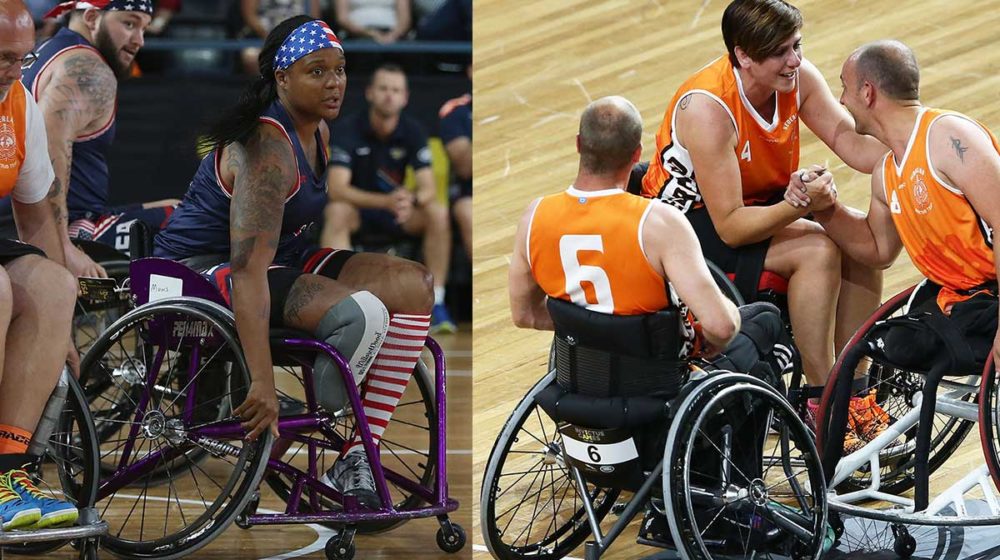As the only two women in the wheelchair basketball final at the Invictus Games Sydney 2018, Holland’s Alina Zoet and American Stephanie Johnson stood out.
“Sometimes it’s hard but I’m very honoured to play with these guys,” said 42-year-old Zoet, a Kosovo veteran who retired from the Netherlands armed forces in 2001.
“I only started basketball in January so it was a surprise for me to get selected. Now I’m just enjoying it and having fun,” she said, adding she could “push, bump and shove” with the best of the men.
“I can hold my own because I like those kinds of sports – it’s technical and it’s hard but there’s a lot of power in the game.”
Johnson, 29, like Zoet, played basketball in her youth. But Johnson found it frustrating to adjust after losing her right leg as the result of a rocket-propelled grenade in Afghanistan.
“At first it was a bit of a struggle, I didn’t want to play in a chair, I wanted to play stand-up basketball but now I’ve grown to love it because I love the sport of basketball,” Johnson said.
“It’s completely different trying to push in a wheelchair and handle a basketball. Stand up was a lot easier.
“It took a bit to learn. I played for a couple of weeks and then stopped because I couldn’t get it, I was more frustrated than anything,” she said.
The frustration eased considerably inside the Quaycentre at Sydney Olympic Park on Saturday with Johnson’s USA team winning the gold medal in the wheelchair basketball final, defeating the Netherlands 29-17.
“Everyone wants to win, be competitive and get gold. But at the end of the day it’s not all about the medals because the bonds you build go far beyond competing,” Johnson said.
“You always have someone there, it doesn’t matter how close they are or how far they are, you always got somebody with you.
“Adaptive sports have helped me a lot. When I first got injured I was in a really dark place and I was that way for at least a year or two. I didn’t know where I was going to go and didn’t think I would be part of a team sport again.
“So when I found adaptive sports it put that spark back in me that I was missing.”
Johnson was injured in 2013 in Afghanistan by merely walking towards a bus stop.
Two rocket-propelled grenades landed back-to-back. They killed four of her fellow soldiers.
The blasts badly damaged her left leg and right foot. She had around 30 surgeries on both legs and in 2016 she opted to amputate her troublesome right leg.
She competed in Toronto in cycling, shot put and discus last year. And in Sydney this year it was again athletics and cycling, with the addition of sitting volleyball and basketball.
For Zoet, she retired from active military service in 2001 and now works as a fitness instructor in her hometown of Elburg, in central Holland.
“I was in Kosovo in 1999. I was among the first group who got into Kosovo – that was my mission. But I completed it and I’ve moved on.”
Now she wants to encourage other servicewomen – current or retired – to get involved in the Invictus Games.
“When I get back most definitely I’m going to encourage them to come because that’s what someone did to me,” Zoet said.
“One of the guys back home said to me ‘You just have to go and train with the other veterans and see what it (Games) brings for you’.
“So now I’m here, I’ve loved it, and I’m very grateful to him.”
And Zoet is not about to stop. Her home country is the next host of the Invictus Games in The Hague in 2020.
“I hope to be there. I will try my hardest. It’s going to be great. We’ve got a lot of ideas,” she said.
Margie McDonald and Julie Parry-Barwick
Invictus Games Sydney 2018
